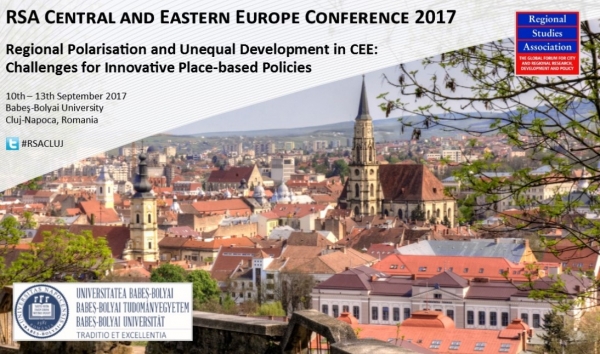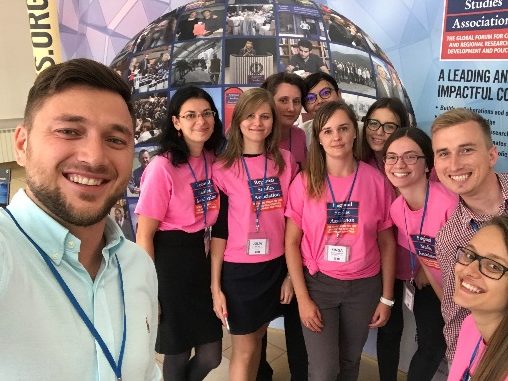Report on the RSA Central and Eastern Europe Conference 2017

Regional Polarisation and Unequal Development in CEE: Challenges for Innovative Place-based Policies
10th – 13th September 2017 at Faculty of Economics and Business Administration, Babeș-Bolyai University, Cluj-Napoca, Romania

The increasing territorial inequalities, reflected through growing regional disparities, leave a strong imprint especially on the Central and Eastern European countries and call for urgent solutions from the academic sphere but also policy and decision-making professionals. Constant dialogue between researchers, interaction between their research results and extensive communication of proposed solutions are fundamental elements in the search for solutions to achieve territorial cohesion. With these ambitions in mind, between 10-13 September 2017 the first RSA Central and Eastern Europe Conference was organized which served as a platform for stimulating scientific debates and exciting discussions about this current topic.
The event took place in Cluj-Napoca, Romania, also known as the heart of Transylvania, not only because of its geographical position but also for its diverse, multi-cultural environment and great reputation as a university city. The conference was hosted by the oldest university in Romania, the Babeș-Bolyai University and took place in the highly selective educational setting of the Faculty of Economics and Business Administration.
A day before the presentation sessions, delegates had the chance to get acquainted with the surroundings of the city by visiting one of the largest salt mine museums in the world, the Turda Salt Mine, to have a relaxing meal in an architectural-protected area and to get on board during a lovely and insightful city tour. This was followed by a Welcome Reception held at the Romanian National Bank where the participants were greeted by the Academic Organizer of the conference Prof. József Benedek (Faculty of Geography) followed by the Chief Executive of the Regional Studies Association Sally Hardy, and the Rector of the Babes-Bolyai University, Prof. Ioan-Aurel Pop. The session was opened by the Deputy Governor of the Romanian National Bank, Prof. Liviu Voinea who gave an intriguing presentation about macroeconomic disparities at regional levels in Romania. The conference welcomed 140 participants from twenty different countries including from outside Europe such as Australia, USA and Japan which shows the increasing interest in research on regional disparities and the process of polarization not only in the CEE Countries but increasingly relevant in a global perspective.
The conference was opened by a plenary session which included two captivating presentations on current and urgent research topics. Prof. Jennifer Clark (Georgia Institute of Technology, USA) discussed the role of smart city industries as market-making enterprises and argued that there is a need for open innovation platforms to ensure both competition and collaboration. On the other hand, Prof. Clark expressed concerns of uneven distribution of Smart City technologies and emphasized the importance of integrating various scales -from individual to regions- into smart city construction processes. The second speaker of the plenary session, Peter Berkowitz (Directorate General for Regional and Urban Policy, European Commission, Belgium) integrated topics of globalization and innovation and gave a thorough analysis about the role of regions in Europe. Berkowitz also reflected on the indelible burden marked by the financial crisis by using a neat metaphor of carrying a rucksack of crisis legacy into future policy making process. Consequently, he argued for the need for third generation regional policies and drew attention for building abilities and capacities at all levels and all sectors of society.
The theme of smart specialization strategies dominated the second plenary of the day where Prof. Dominique Foray (École Polytechnique Fédérale de Lausanne, Switzerland) reflected on the experimental and transformative nature of smart specialization activities that do not consist of high technologies only. Consequently, Prof. Foray drew attention on the possibility of failure in such actions and pointed to the need for flexibility and monitoring of related strategies. The first day ended in a pleasant Welcome Reception sponsored by the Cluj-Napoca City-Hall that took place at the beautiful Casino Building situated in the natural environment of the Central Park.
On Tuesday, the third panel session took place where Prof. Zoltán Kovács (University of Szeged, Hungarian Academy of Sciences, Hungary) presented on the topic of urbanization and territorial polarization in CEE. Prof. Kovács highlighted the increasing differentiation within the CEE urban regions and pointed out the weak planning control that trigger negative consequences of urbanization processes and lead to significant social and environmental challenges. The second plenary speaker of the day was Prof. Peter Meusberger (Heidelberg University, Germany) who presented analysis on reasons and consequences of spatial disparities of educational achievements, an imperative topic for the academic community. Prof. Meusberger articulated on the role of educational attainment as a shortcut to acquire valuable information about a region, but also an early warning that reflects on socioeconomic change. Nevertheless, Prof. Meusberger indicated the need to choose the assessment criteria carefully, as educational attainment can also be an unstable and granular indicator in the frame of time and space.
The highlight of the evening was the Gala Dinner which took place at the lovely Grand Hotel Napoca where the well-deserved Best Conference Paper awards went to Szendi Dóra (University of Miskolc, Hungary) and Alexandru Bănică (Al. I. Cuza University Iași, Romania).
On the final day, the session was opened by the Early Career Speaker Dr. Lech Suwala (Institute of Economy Geography, Humboldt-University Berlin, Germany) who gave an interesting presentation about field-configuration and regional platforming in the Polish Podkarpackie Region. Dr. Suwala concluded that success of cluster-based policy is highly dependent on pre-formation, collaboration as well as distant industries and long-term vision. Innovative ideas as well as development of future agendas serve as prerequisites in building competitive advantages. The following presentation held by Prof. Ewa Korcelli-Olejniczak (Institute of Geography and Spatial Organization, Polish Academy of Sciences, Poland) was about ways of dealing with social diversity in Warsaw, a dualism between reality and policy. The findings determined that diversity in its sense is being rediscovered, but its successful management calls for new governance solutions as well as changes in the policy making process. The last plenary presenter, Prof. Michael Keating (School of Social Sciences, University of Aberdeen, UK) treated the audience to an exciting and challenging presentation on contesting European regions: rescaling and the making of space. With a straightforward approach Prof. Keating provided excellent insights into the intricate process of rescaling and regional emergence, yet without overshadowing the importance of the state level in the process of place shaping.
The group of volunteers at the conference

The topics discussed during the plenary sessions triggered interesting questions from the audience and ended in constructive discussions. Moreover, next to the plenary sessions there were a wide variety of interesting workshops including such topics as resilience, territorial cohesion and change, smart specialization, as well as sustainable solutions in dealing with growing regional imbalances. The relevance of the conference theme and the interest shown towards the research was also proved by the large number of press releases in the Romanian as well as Hungarian press and media coverage.
Press conference on the first RSA Central and East European Conference, Cluj-Napoca, Romania Source

I have been a member of the RSA for five years now and attended most of the European Annual Conferences organized by the RSA during this period. Nevertheless, as being an inaugural event focusing specifically on Central and Eastern Europe, I assumed that the interest shown towards the topic would be much lower. Nonetheless, it was great to see that the first RSA Central and Eastern Europe Conference had such a great turnout, creating a pleasant, dynamic atmosphere, giving place for fruitful discussions and strengthening us in becoming a leading and impactful community. Therefore, the conference proved to be successful in achieving its aim.
Nevertheless, there is plenty of room for research focused on Central and Eastern European issues that call for engagement and commitment from researchers with interdisciplinary backgrounds. Therefore, the second edition of the RSA’s CEE conference will be held in Lublin, Poland in 2019. See you all there!